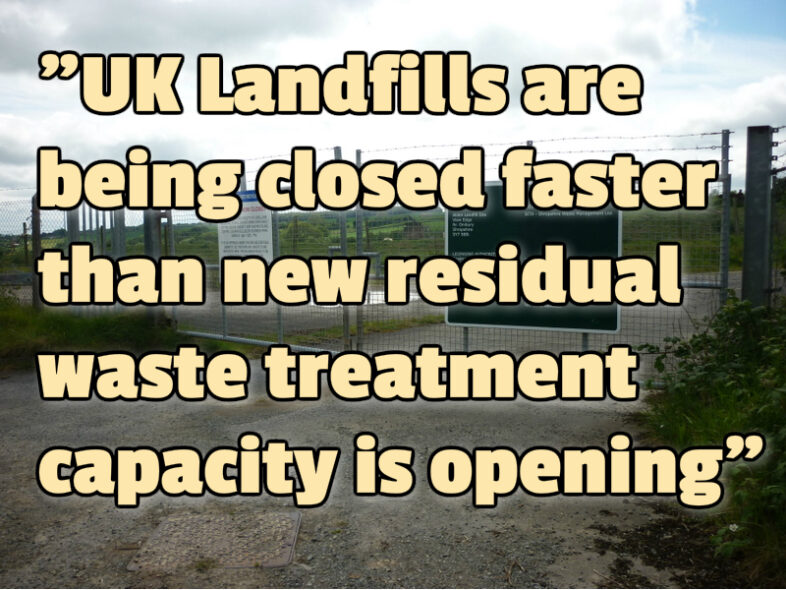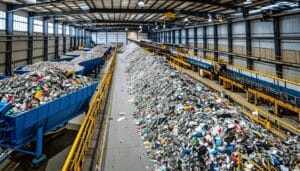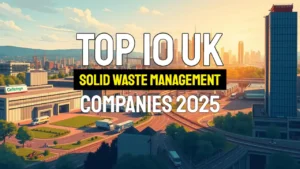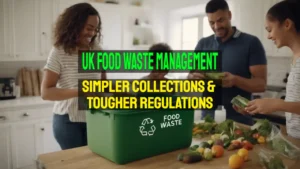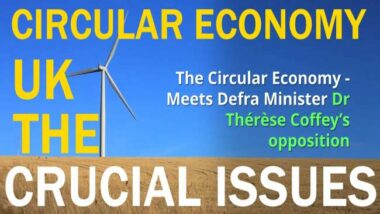The question is whether there is a UK Waste Treatment Capacity Crisis looming, or not? If you have watched our teaser video on YouTube on this subject, you will no doubt be confused about the conflicting views. You are not alone! The claims and counter claims which surround this subject ARE very confusing.
The reason we are airing the subject here now, is that the UK's Institution of waste management professionals has waded into the muddy waters of confusion which exist around this complex subject, and while providing information on this subject, we would be interested in receiving comments from any readers from the UK waste management industry with knowledge about this subject.
— Video Arriving Here Soon —
Issues Affecting a UK Waste Treatment Capacity Crisis
Sometimes formulating a question clearly is necessary, before it becomes possible to find an answer. I am not sure the right questions are being asked so far. I would suggest the UK waste and recycling industry needs, in the absence of strict EU Directives compliance being needed, to consider:
- What proportion of the UK's waste should be recycled across each main waste type, on the basis of balancing the best recycling rates achievable without excessive cost? Cost is generally a crude indication of how much resource is being required to achieve an outcome and should not be ignored when “green” outcomes are sought. For example, it would make no sense to recycle energy to other countries in the form of the export of low-quality refuse derived fuel (RDF), if doing that expends large amounts of fossil fuel, discharged from very dirty marine diesel engines.
- Based on reports and a consensus of science-based opinion considering both cost, and the effects on carbon emissions and climate change effect, Recycling Targets Need to be Set for Each Waste Type.
- An open exchange of data needs to take place between all waste treatment operators on waste tonnages predicted, and the capacities planned to be on-stream over the time period of the reports.
- An Organisation Such as Eunomia, WRAP etc., should then consider the situation again, and report regarding UK Waste Treatment Capacity.
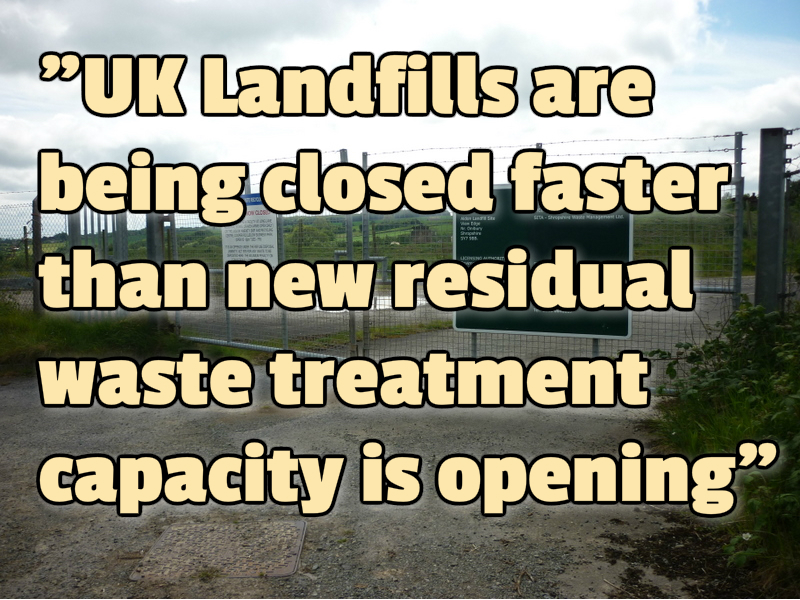 Until this is done there will continue to be conflicting views regarding the primary issues of:
Until this is done there will continue to be conflicting views regarding the primary issues of:
a) Incineration capacity needed and available.
b) Recycling and residual waste separation capacity needed.
c) Landfill capacity needed;
but at least the debate would be better informed than at present.
The Need for New Landfill Capacity in the UK
Landfill capacity requirements are not going reduce to zero. ESA Chairman, Stewart Davies, writing in the July 2017 edition of the CIWM Journal, has stated that landfills are closing faster than waste-to-energy plants are coming on-stream. Very quickly a waste treatment capacity crisis would also become a landfill capacity problem (see “Agenda Battle”), invoking the need to rapidly develop brand new landfills to take pre-treated waste for which there exists no other capacity for its disposal, other than into landfills. All unrecyclable waste has to go somewhere.
Excerpt from the Article Which Provoked this Article:
UK “Sleepwalking” Into Waste Treatment Capacity Crisis – ESA
Posted on 8 August 2017 by Darrel Moore:
The Environmental Services Association (ESA), has issued a stark warning following the release of a new Eunomia report, labelling its findings are “flawed”.
The Eunomia report, Residual waste infrastructure review issue 12, says that were all residual waste treatment facilities currently in the pipeline to operate at full capacity, together, they would limit the UK’s recycling rate to no more than 63%.
The report highlights the significant growth in residual waste treatment capacity that has taken place since the company started tracking facility development in 2009.
“Their [Eunomia’s] abilities to overstate available capacity and under-predict residual waste arisings are astounding”.
The report considers two future scenarios, based on the different policy directions available to the UK government.
In Scenario 1, the UK continues to apply current and planned EU recycling targets, which leads to further reductions in residual waste.
In Scenario 2, the UK meets existing (household) recycling targets for 2020; thereafter, household recycling rates remain through to 2030, while there is a modest increase in Commercial & Industrial (C&I) recycling rates.
ESA Executive Director, Jacob Hayler, however, says the findings are “flawed” and have been “contradicted by report after report from everyone else who’s looked at our residual waste treatment needs.”
He said: “Year after year these consultants have claimed that the UK was heading for overcapacity – its earlier reports suggested that we would already have reached overcapacity today – and it is galling that they continue to repeat the message when we are crying out for more investment in our industry.
“Their abilities to overstate available capacity and under-predict residual waste arisings are astounding.
“The consensus position on waste treatment is that we will end up over five million tonnes short of energy from waste capacity by 2030. This is what the government needs to understand if it is not to sleepwalk into a capacity crisis.”
“We need to be recycling our waste, not wasting millions of pounds building yet more incinerators that will be redundant in a circular economy.”
According to Shlomo Dowen, national coordinator of the UK Without Incineration Network, however, says the report “understates” the problem.
“Most reports on residual waste treatment capacity are commissioned by companies with a financial stake in investment in new waste incineration capacity, whereas Eunomia’s reports are more independent.
“Eunomia’s latest report confirms that we will soon have more incineration capacity than residual waste. However, this understates the problem because much of what is currently described as ‘residual waste’ can actually be recycled or composted. via CIWM-Journal Online (July 2017 edition).
Make what you will from this. If you find the above article text hard to understand, rest assured that you are not alone!
Revolutionizing Waste Recovery: Latest Separation And Sorting Innovations
Waste recovery is changing fast, thanks to new separation and sorting technology. This tech helps us sort trash better, so we can recycle more things. For example, Stadler has built a big plant in Spain for VAERSA that makes recycling easier and smarter. Keson is finding new ways to deal with old tyres, helping both […]
Top 10 UK Solid Waste Management Companies 2025
The UK waste management sector stands as a vital industry worth billions of pounds. The top UK Solid Waste Management Companies are the leading waste management firms in Britain. These companies handle millions of tonnes of rubbish each year. The industry has transformed significantly over the past two decades through strategic mergers and environmental innovations. […]
Ramp Method of Waste Disposal – Landfill Guide & Techniques
The ramp method optimizes landfill operations by creating an inclined surface, allowing efficient waste compaction and daily cover application. Unlike traditional methods, it requires minimal excavation, reducing costs and extending landfill lifespan. Proper implementation and equipment maintenance are key to effective ramp method performance in various terrains…
The Future of UK Food Waste Management – Simpler Collections and Tougher Regulation
The future of UK food waste management will be a big push toward higher recycling rates through simpler collection and far greater consistency across the nations, helping citizens understand how to be green and recycle more organic waste. As the UK continues to advance its environmental goals, recently announced government policies aimed at simplifying waste […]
